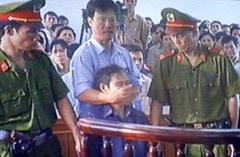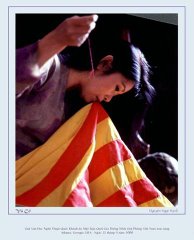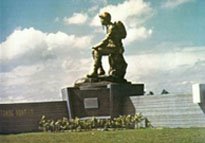
Tue Nov 27, 2007
HANOI (Reuters) - Two jailed political activists defiantly called for multi-party democracy and more freedom of speech in one-party ruled Vietnam on Tuesday as an appeals court upheld their conviction, with slightly reduced prison terms.
Lawyers for Nguyen Van Dai and Le Thi Cong Nhan, whose release has been called for by the European Union and the United States, argued before Superior Court judges in the communist-run country that their clients were peaceful and should be set free.
But the panel of judges ruled that Dai should serve four years imprisonment and four years under "administrative surveillance", or house arrest -- one year less for both parts of the sentence handed down by the Hanoi People's Court in May.
"I demand democracy, freedom and a multiparty system so that the Vietnamese people can exercise their right to freely choose the party to lead the whole country," Dai, 38, said in his statement to the court before the verdict.
There are about three million party members in the underdeveloped Southeast Asian country's population of 85 million.
The government says the two activists, both lawyers, broke the law and were not convicted for their political views.
Nhan's jail sentence was also reduced by one year to three years from four years. Her term under surveillance was reduced to three years from four years.
Bespectacled Nhan, who was wearing a red sweater over a light blue shirt, told the judges: "I believe in freedom of speech. Even now I raise my voice for freedom of speech as it is a basic freedom."
Foreign journalists and diplomats observed the five hours of proceedings in a separate room with their interpreters.
The court affirmed the lower court opinion that the two defendants had been in possession of documents or distributed documents that defamed the Communist Party and its leaders.
They were charged and convicted in May of "spreading propaganda against the state" and defaming the ruling party.
Many of Vietnam's Western trade partners and allies decried the sentences as too harsh.
In Tuesday's hearing one defence lawyer, Dang Trung Dung said, "Vietnam is a member of the World Trade Organisation and it is time it should abide by international conventions".
He said his clients "have the right to argue, to write articles".
Vietnam joined the WTO in January, part of Hanoi's policy to open the economy. However, the government is intolerant of advocates of a multiparty system and has rounded up about 30 activists this year.
Dai and Nhan are both Protestants. They advocated a multiparty system and gave legal advice to people who said authorities prevented them from practicing religion.















